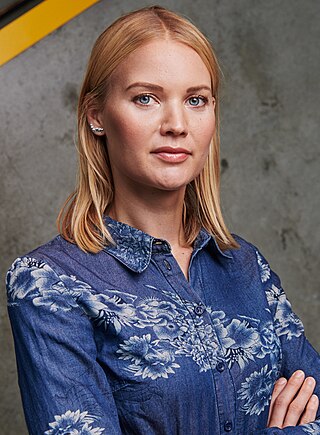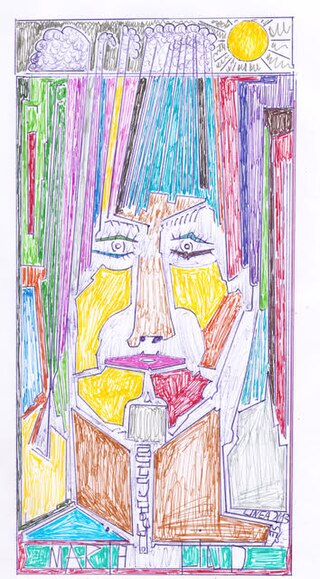Related Research Articles

A curator is a manager or overseer. When working with cultural organizations, a curator is typically a "collections curator" or an "exhibitions curator", and has multifaceted tasks dependent on the particular institution and its mission. The term "curator" may designate the head of any given division, not limited to museums. Curator roles include "community curators", "literary curators", "digital curators", and "biocurators".

The Swedish Institute is a government agency in Sweden with the responsibility to spread information about Sweden outside the country. It exists to promote Swedish interests, and to organise exchanges with other countries in different areas of public life, in particular in the spheres of culture, education, and research.
The Language Council of Sweden is the primary regulatory body for the advancement and cultivation of the Swedish language. The council is a department of the Swedish government's Institute for Language and Folklore. The council asserts control over the language through the publication of various books with recommendations in spelling and grammar as well as books on linguistics intended for a general audience, the sales of which are used to fund its operation. The council also works with four of the five official minority languages in Sweden: Finnish, Meänkieli, Yiddish, and Romani alongside the Swedish Sign Language.

Hans Ulrich Obrist is a Swiss art curator, critic, and art historian. He is artistic director at the Serpentine Galleries, London. Obrist is the author of The Interview Project, an extensive ongoing project of interviews. He is also co-editor of the Cahiers d'Art review. He lives and works in London.
Microblogging is a form of blogging using short posts without titles known as microposts. Microblogs "allow users to exchange small elements of content such as short sentences, individual images, or video links", which may be the major reason for their popularity. Some popular social networks such as X (Twitter), Threads, Tumblr, Mastodon, Bluesky and Instagram can be viewed as collections of microblogs.

San Giovenale is the modern name of the location of an ancient Etruscan settlement close to the modern village of Blera, Italy. The main settlement consists of high plateau split in two parts, normally referred to as the Acropolis and the Borgo. The settlement is surrounded by a number of burial sites. The excavations of the settlement were divided into eight areas: Areas A-F on the Acropolis, the Borgo and the Bridge over the Pietrisco.
Digital curation is the selection, preservation, maintenance, collection, and archiving of digital assets. Digital curation establishes, maintains, and adds value to repositories of digital data for present and future use. This is often accomplished by archivists, librarians, scientists, historians, and scholars. Enterprises are starting to use digital curation to improve the quality of information and data within their operational and strategic processes. Successful digital curation will mitigate digital obsolescence, keeping the information accessible to users indefinitely. Digital curation includes digital asset management, data curation, digital preservation, and electronic records management.

Diaspora is a nonprofit, user-owned, distributed social network. It consists of a group of independently owned nodes which interoperate to form the network. The social network is not owned by any one person or entity, keeping it from being subject to corporate take-overs or advertising. According to its developer, "our distributed design means no big corporation will ever control Diaspora."
Pearltrees is a visual and collaborative curation tool that allows users to organize, explore and share any URL they find online as well as to upload personal photos, files and notes. The product features a visual interface that allows users to drag and organize collected URLs, and other digital objects that themselves can be further organized into collections and sub-collections,(URLs). Users of the product can also engage in social/collaborative curation using a feature called Pearltrees Teams.

Apexart is a non-profit art space located in Lower Manhattan, New York. The organization, founded by Steven Rand in 1994, combines spaces for creative endeavor and curation to encourage experimentation and innovation. apexart offers several open call programs intended to even the playing field between applicants, diversify experience and perspective, and push back against the commercialization of art.

8tracks.com is an internet radio and social networking website revolving around the concept of streaming user-curated playlists consisting of at least 8 tracks. Users create free accounts and can browse the site and listen to other user-created mixes, as well as create their mixes. The site also has a subscription-based service, 8tracks Plus, although this is currently only available to listeners based in the United States and Canada.
Shadow banning, also called stealth banning, hell banning, ghost banning, and comment ghosting, is the practice of blocking or partially blocking a user or the user's content from some areas of an online community in such a way that the ban is not readily apparent to the user, regardless of whether the action is taken by an individual or an algorithm. For example, shadow-banned comments posted to a blog or media website would be visible to the sender, but not to other users accessing the site.
Curators of Sweden was a social media campaign initiated by the government agency Swedish Institute and VisitSweden on Twitter. It was launched on December 10, 2011 with the main concept of a rotating spokesperson, or rather a curator, on the official Twitter account of Sweden, @sweden. The account has been cited as popularising the concept of Rotation Curation.

Maria Popova is a Bulgarian-born, American-based essayist, book author, poet, and writer of literary and arts commentary and cultural criticism that has found wide appeal both for her writing and for the visual stylistics that accompany it.

iNaturalist is an American 501(c)(3) nonprofit social network of naturalists, citizen scientists, and biologists built on the concept of mapping and sharing observations of biodiversity across the globe. iNaturalist may be accessed via its website or from its mobile applications. iNaturalist includes an automated species identification tool, and users further assist each other in identifying organisms from photographs and even sound recordings. As of 25 December 2024, iNaturalist users had contributed approximately 222,324,751 observations of plants, animals, fungi, and other organisms worldwide, and 290,007 users were active in the previous 30 days.
Spring.me was a social networking service. Until a rebranding in 2013, it was known as Formspring, a question-and-answer-based social network launched in 2009 by Ade Olonoh, the founder of online form builder Formstack.

Love Henrik Samuel Antell is a Swedish-Finnish singer and artist. As a student he attended Adolf Fredrik's Music School in Stockholm. Antell is known as the frontman of the band Florence Valentin, and as a solo singer. Antell's parents were both from Finland. He grew up in Östermalm in central Stockholm but nowadays resides in Hägersten. He was educated as an illustrator at Konstfack between 2001 and 2007, and he is inspired by Lars Hillersberg. Between 2007 and 2011, Antell was a guitarist in the folk-rock group Perssons Pack. He participated in Mika Ronkainen's drama documentary film "Ingen riktig finne"; the film won first prize in the category Best Nordic Documentary at the Gothenburg Film Festival in 2013.

Megan E. Schwamb is an American astronomer and planetary scientist, and lecturer at Queen's University, Belfast. Schwamb has discovered and co-discovered several trans-Neptunian objects, and is involved with Citizen science projects such as Planet Four and Planet Hunters.

Emma Maria Frans is a postdoctoral researcher in medical epidemiology at Karolinska Institutet in Stockholm and well-known science communicator in Sweden. She is also known for writing the column "Vetenskapskollen" in the newspaper Svenska Dagbladet, where she examines the correctness and scientific accuracy of sensational news and popular science articles.

Maria Lind is a curator, writer and educator from Stockholm. Since 2023, Lind is the director of Kin Museum of Contemporary Art in Giron/Kiruna. From 2020 to 2023, she served as the counsellor of culture at the embassy of Sweden in Moscow. Prior to that, she was the director of Stockholm’s Tensta Konsthall, the artistic director of the 11th Gwangju Biennale, the director of the graduate program at the Center for Curatorial Studies, Bard College, the director of IASPIS in Stockholm and the director of Kunstverein München, Munich.
References
- ↑ "@Sweden's citizen driven nation branding is a global success - visitsweden.com". Archived from the original on May 23, 2012. Retrieved April 24, 2012.
- ↑ "@sweden's Citizen Driven Nation Branding is a Global Success". Reuters. 2012-04-19. Archived from the original on 2015-09-24. Retrieved 2013-11-21.
- ↑ "Regular Citizens Now in Charge of Sweden's Twitter Account". Time. 2011-12-16. Retrieved 2013-11-21.
- ↑ "Welcome to nginx". online.wsj.com. Archived from the original on 12 July 2012. Retrieved 3 February 2022.
- ↑ Savage, Maddy (2012-01-14). "BBC News - Twitter feed gives Swedes a new picture". Bbc.co.uk. Retrieved 2013-11-21.
- ↑ Bill O'Reilly (2012-03-26). "Swedish Mom Starts 'Breastfeeding Riot' - Fox Nation". Fox News. Archived from the original on 2012-07-10. Retrieved 2013-11-21.
- ↑ "Beyond @sweden: More Country Names on Twitter are Rotating Users". Mashable.com. 2012-06-26. Archived from the original on 2013-10-24. Retrieved 2013-11-21.
- ↑ "Chronology". Rotation Curation. Retrieved 2013-11-21.